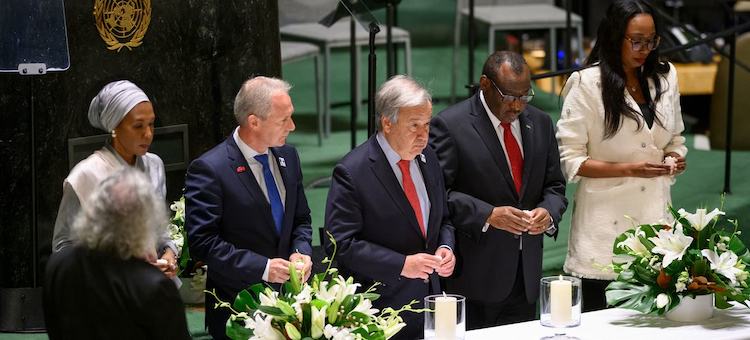‘Genocide Can Happen Anywhere
By J Nastranis
NEW YORK, 15 April 2023 (IDN) — The UN General Assembly commemorated the International Day of Reflection on the 1994 Genocide against the Tutsi in Rwanda. It mourned the more than one million children, women, and men who perished in one hundred days of horror—in the presence of the UN Assistance Mission for Rwanda.
Decades-long intercommunal tensions and clashes unfolded before the world’s eyes in April 1994 despite the UN General Assembly’s unanimous adoption of the Genocide Convention in 1948, which defines genocide as a crime under international law.
UN Secretary-General António Guterres warned that hate speech is an alarm bell—the louder it rings, the greater the threat of genocide.
“We pay tribute to the resilience of the survivors [and] recognize the journey of the Rwandan people towards healing, restoration, and reconciliation. And we remember—with shame—the failure of the international community. The failure to listen and the failure to act.”
Mr. Guterres explained that the killings were planned long in advance and executed deliberately and systematically; they were premeditated murders committed in broad daylight.
A generation since the genocide, “we must never forget the dangers posed by the fragility of civility in all societies; it precedes and promotes violence”, he cautioned.
The hate and propaganda that paved the path to genocide in Rwanda was broadcast on TV, printed in newspapers, and blasted over the radio, he said.
“Today, the megaphones of hate are even bigger,” he said, noting that across the internet, incitement to violence, vicious lies and conspiracies, genocide denial and distortion, and the demonization of “the other”, proliferate with little to no checks.
Calling for stronger guardrails, clearer responsibilities, and greater transparency in the digital world, he said the launch of the UN Strategy and Plan of Action on Hate Speech provides a framework for support to countries to counter this scourge while respecting freedom of expression and opinion.
“Today, I call on all Member States to become parties to the Convention on the Prevention and Punishment of the Crime of Genocide without delay, and I call on all States to back their commitments with action,” the UN chief said.
“Together, let us stand firm against rising intolerance,” he added. “Let us truly honour the memory of all Rwandans who perished by building a future of dignity, security, justice, and human rights for all.”
Rwandan genocide was ‘not an accident’
General Assembly President Csaba Kőrösi said the genocide was not an accident, but rather, it stemmed from years of fomenting a racist ideology and waging a campaign aimed at the systematic destruction of a population. As it was carried out, the world was silent.
“We were silent despite repeated and unmistakable early warnings about the preparation of genocide,” he said. “To this unconscionable inaction, we must say ‘never again’.”
With strength and determination, the people of Rwanda have rebuilt their nation from the ashes of devastation. Today, the success of these endeavours is seen everywhere, he said, pointing to gender parity in the lower house of Parliament, the vibrancy of Rwandan innovation, the resilience of its economy, and in the strength of its health care system.
“Importantly, Rwanda has invested in its young people, opening opportunities for those under 20 years old – who represent half of its dynamic population,” he said. “Rwandans have built a nation that looks towards a better future. May we in the General Assembly do the same.”
‘They killed my entire family’
The Assembly also heard from genocide survivors, who shared their harrowing stories.
Ahead of the event, Henriette Mutegwaraba, 50, a survivor who now lives in the United States, met with UN News to discuss how she survived and healed, and how hate speech today strikes a haunting echo of the genocide in Rwanda.
“Every time I talk about it, I cry,” she said. “They raped women. They opened pregnant women; opened their wombs with a knife. They put people in septic holes alive. They killed our animals. They destroyed our homes. They killed my entire family, my mom, my four siblings.”
During the 1994 genocide against Tutsi, “the whole world turned a blind eye”, she said. “They knew. Nobody came to help us. Nobody came to us. I hope that this will never happen to anybody in this world. I hope that the UN can come up with a way to respond quickly.”
‘Genocide can happen anywhere’
Nobody is immune to what happened to Rwanda in 1994, she said, emphasizing that there is so much propaganda happening in the United States and people are not paying attention and the country is very divided.
Ms. Mutegwaraba elaborated on this current issue in her book By Any Means Necessary. Indeed, she said she had felt the same fear on 6 January 2021 during the attack on the United States capitol that she did in April 1994.
“Genocide can happen anywhere,” she said. “Do we see the signs? Yes, we see the signs. Do we pretend that it doesn’t affect us or our world? Yes, we do. My message is this: wake up. Something’s happening. It’s all about propaganda.” [IDN-InDepthNews]
IDN is the flagship agency of the Non-profit International Press Syndicate.
UN Photo/Loey Felipe | Secretary-General António Guterres (centre) and other participants light candles at the UN General Assembly event commemorating the International Day of Reflection on the 1994 Genocide against the Tutsi in Rwanda.
Visit us on Facebook and Twitter.
IDN is the flagship agency of the Non-profit International Press Syndicate.
We believe in the free flow of information. Republish our articles for free, online or in print, under Creative Commons Attribution 4.0 International, except for republished articles with permission.

